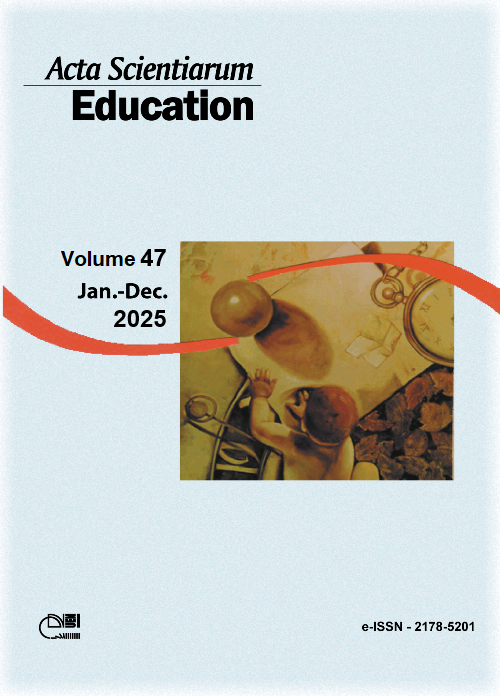Pedagogia no Portal Educação: uma análise crítica a partir da teoria da semicultura
Resumo
Este texto tem por objeto a proposta pedagógica movimentada pelo Portal Educação, empresa de oferta de cursos online. Para tanto, objetiva apresentar uma análise da proposta pedagógica da empresa a partir da Teoria da Semicultura. Metodologicamente, o trabalho apresenta-se como um exercício crítico-analítico, estruturado a partir do aporte teórico da Teoria Crítica (Adorno & Horkheimer, 1985; Adorno, 1996). A análise estrutura-se a partir do conceito de Semiformação e tem como fonte primária de pesquisa o site eletrônico da referida empresa educacional. Assume-se, teórica e metodologicamente, que a própria inexistência histórica, política e econômica de processos mais orgânicos de ruptura com a sociabilidade capitalista industrial implica a produção de condições concretas para seu aprimoramento em estágios mais complexos e elaborados a partir de uma lógica com poder de afetação subjetiva-objetiva com lastro-controle das identidades individuais e coletivas. O trabalho indica, também, que a pedagogia movimentada pelo Portal é figura filiada a um ideário de pedagogia possível na configuração avançada e complexa da sociabilidade de início do século XXI, portanto, com guardada fidelidade ao objetivo de contribuir com a formação de sujeitos material e normativamente vinculados social, cultural, política e economicamente à referida sociabilidade.
Downloads
Referências
Abbagnano, N. (2007). Dicionário de filosofia. Martins Fontes.
Adorno, T. (1996). Teoria da semiformação. Educação & Sociedade, 56(XVII), 388-411.
Adorno, T., & Horkheimer, M. (1985). Dialética do esclarecimento: fragmentos filosóficos (A. G. de Almeida, Trad). Zahar.
Antunes, R. (2009). Os sentidos do trabalho: ensaio sobre a afirmação e a negação do trabalho. Boitempo.
Brasil. (1988). Constituição da República Federativa do Brasil de 1988. http://www.planalto.gov.br/ccivil_03/constituicao/constituicao.htm
Debord, G. (2017). A sociedade do espetáculo. Contraponto.
Decreto nº 10.656 de 22 de março de 2021. (2021). Regulamenta a Lei nº 14.113, de 25 de dezembro de 2020, que dispõe sobre o fundo de manutenção e desenvolvimento da educação básica e de valorização dos profissionais da educação. Brasília, DF. https://bitily.me/JUvYP
Duarte, N. (2001). As pedagogias do ‘aprender a aprender’ e algumas ilusões da assim chamada sociedade do conhecimento. Revista Brasileira de Educação, 1(18), 35-40. https://doi.org/10.1590/S1413-24782001000300004
Freitas, L. C. (2014). Os reformadores empresariais da educação e a disputa pelo controle do processo pedagógico na escola. Educação & Sociedade, 35(129), 1085-1114. https://doi.org/10.1590/ES0101-73302014143817
Frigotto, G. (2010). Educação e a crise do capitalismo real. Cortez.
Gatti, B. A., Barretto, E. S. Sá, & André, M. E. D. A. (2011). Política docente no Brasil: um estado da arte. Unesco.
Gentili, P. (1998). Educar para o desemprego: a desintegração da promessa integradora. In G. Frigotto (Org.), Educação e crise do trabalho: perspectivas para final de século (pp. 76-99). Vozes.
Giolo, J. (2008). A educação a distância e a formação de professores. Educação & Sociedade, 29(105), 1211-1234. https://doi.org/10.1590/S0101-73302008000400013
Kosik, K. (1976). Dialética do concreto. Paz e Terra.
Laval, C. (2019). A escola não é uma empresa: o neoliberalismo em ataque ao ensino público. Boitempo.
Lei nº 9.394, de 20 de dezembro de 1996. (1996). Estabelece as diretrizes e bases da educação nacional. Presidência da República. http://www.planalto.gov.br/ccivil_03/leis/l9394.htm
Lei nº 10.172, de 9 de janeiro de 2001. (2001). Aprova o Plano Nacional de Educação e dá outras providências. Presidência da República. http://www.planalto.gov.br/ccivil_03/leis/leis_2001/l10172.htm
Portal Educação. (2022a). Tem certificado?. https://www.portaleducacao.com.br/curso-online-letramento-digital-novo-iped/p
Portal Educação. (2022b). Institucional. https://www.portaleducacao.com.br/institucional
Portal Educação. (2022c). Como funciona a prova?. https://www.portaleducacao.com.br/curso-online-pedagogia-astronomia/p
Portal Educação. (2022d). Vou aprender mesmo?. https://www.portaleducacao.com.br/curso-online-novoeste-fundamentos-do-planejamento-estrategico/p
Portal Educação. (2022e). Como funciona o curso? Ele é autorizado pelo MEC?. https://www.portaleducacao.com.br/curso-online-pedagogia-disturbios-de-aprendizagem/p.
Portal Educação. (2022f). Portal Play. https://online.portaleducacao.com.br/novo-portal-play
Portal Educação. (2022g). Bem-vindo ao Blog do Portal Educação!. https://blog.portaleducacao.com.br/
Portal Educação. (2022h). Portal Play. Conheça os nossos cursos. https://www.portaleducacao.com.br/portal-play-empresas
Resolução nº 1, de 15 de maio de 2006. (2006). Institui Diretrizes Curriculares Nacionais para o Curso de Graduação em Pedagogia, licenciatura. Ministério da Educação. http://portal.mec.gov.br/cne/arquivos/pdf/rcp01_06.pdf
Seki, A. K., Souza, A. G. & Evangelista, O. (2019). O crescimento perverso das licenciaturas privadas. In O. Evangelista, A. K. Seki, A. G. Souza, M. Titton, & A. B. Avila (Orgs.), Desventura dos professores na formação para o capital (pp. 61-106). Mercado de Letras.
Wolff, S. (2005). Informatização do trabalho e reificação: uma análise à luz dos programas de qualidade total. Editora da UNICAMP; EDUEL.
This work is licensed under a Creative Commons Attribution 4.0 International License.
DECLARAÇÃO DE ORIGINALIDADE E DIREITOS AUTORAIS
Declaro que o presente artigo é original, não tendo sido submetido à publicação em qualquer outro periódico nacional ou internacional, quer seja em parte ou em sua totalidade.
Os direitos autorais pertencem exclusivamente aos autores. Os direitos de licenciamento utilizados pelo periódico é a licença Creative Commons Attribution 4.0 (CC BY 4.0): são permitidos o compartilhamento (cópia e distribuição do material em qualquer suporte ou formato) e adaptação (remix, transformação e criação de material a partir do conteúdo assim licenciado para quaisquer fins, inclusive comerciais).
Recomenda-se a leitura desse link para maiores informações sobre o tema: fornecimento de créditos e referências de forma correta, entre outros detalhes cruciais para uso adequado do material licenciado.
















































